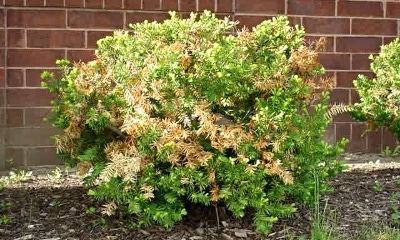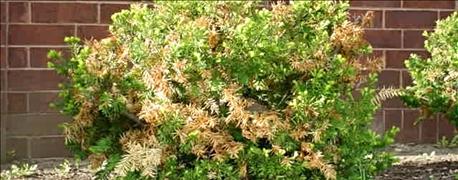May 9, 2016

When fixing up the farmstead this spring, be careful about the plants you decide to throw over the livestock fence. Some houseplants and shrubs contain toxins in the leaves, stems or flowers and can be poisonous to pets and livestock according to Tim Schnakenberg, agronomy specialist with University of Missouri Extension.
Homeowners need to be aware that there are several landscape plants poisonous to livestock. Probably the most toxic are Japanese yews.

DANGEROUS SHRUB: Cattle in Missouri died after eating Japanese yew discarded over the farm fence. Homeowners should dispose of this and other shrubs, plants and flowers properly.
"There have been several confirmed cases of cow deaths due to cows eating Japanese yew trimmings," Schakenberg explained. "In one case trimmings were buried in a ravine but sprouted and grew the next spring and killed several head of the farmer's cattle."
He warns farmstead owners not to throw pruned shrubs or dying houseplants over the back fence or into an area that livestock can reach.
"Southwest Missouri has a growing goat population and they will eat almost anything in front of them and that can be dangerous," he noted. "For example, rhubarb creates hypocalcaemia or a low calcium condition which in turn, will cause kidney failure in goats."
Individuals need to make certain any trimmings or dying plants are burned or gotten rid of in a safe manner.
The list
The azalea, rhododendrons, black locust, boxwood, buckeye, elderberry, Virginia creeper, and wisteria can cause serious illness or death with sufficient amounts consumed to livestock.
Wilted tree leaves of the prunus family, like cherry and plum, will give off cyanide gas when eaten and then that causes asphyxiation in ruminants.
Certain houseplants can be toxic especially to curious pets that like to chew on things. These pets may end up chewing and consuming parts of plants.
"Houseplants that can kill a pet if they are consumed are the Chinese evergreen, calla lily, dieffenbachia, croton, and elephant ear," Schnakenberg added.
There are also several flowers that you would not want to throw over the fence to livestock. For example, Schnakenberg said, caladiums, cardinal flowers, and castor beans plants will poison livestock.
For more information on plants toxic to livestock, contact your local MU Extension.
Source: University of Missouri Extension
You May Also Like




